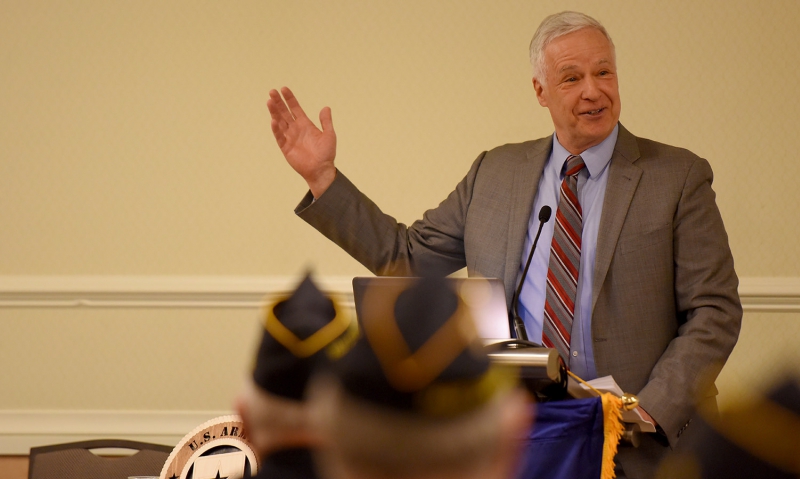
Representatives from major corporations share why those employees with military service bring value to their companies.
Separating a suicide bomber from a group of Afghan and U.S. leaders in Assadabad, Afghanistan, saved multiple lives while earning U.S. Army Capt. Florent Groberg the Medal of Honor. But when the bomb detonated, it also cost 45-50 percent of Groberg’s left calf muscle, and resulted in significant nerve damage, a blown eardrum and a mild traumatic brain injury.
Groberg spent more than two years recovering at Walter Reed Army Medical Center. Though it was a grueling process, Groberg admits there was an upside to it.
“Going through my transition, obviously I had some issues – some issues with (post-traumatic stress disorder), some issues with self-identity (and) survivor’s guilt,” said Groberg, who medically retired the Army in 2015. “But really, I had a passion in the Army. I had goals to continue on. That all ended in eight seconds. I just became a statistic.
“But I was lucky, because I had a college degree. And I got to spend a couple years of my life recovering at Walter Reed, which gave me an opportunity to really plan my future. That took a lot longer than I expected. A lot of my peers, a lot of my friends, they don’t have the same opportunities. What they faced was an uncertain world in their transition.”
Groberg successfully navigated the transition process, eventually landing the position as director of Veterans Outreach & the Eastern Region Community for Boeing. But he knows it’s not always that easy.
“You take me aside and you really look at the normal servicemember transitioning, and they’re struggling,” he said. “They’re struggling because they don’t know what their passion is.”
Programs that corporations are implementing in order to help veterans find that passion was the topic of a recent American Legion-sponsored panel discussion in Washington, D.C. Moderated by Michael Michaud, the former assistant secretary in the Department of Labor's Office of the Assistant Secretary for Veterans' Employment and Training (OASVET), the panel included Groberg and reps from UPS, Microsoft and General Dynamics. The trio discussed what skills veterans bring to the table and how hiring them benefits their companies.
Groberg said that Boeing employs more than 21,000 veterans but admitted “we have to do better. That’s a big number. We still need to find the right individuals that really fit into the Boeing Company. And I’m not talking about hiring veterans because they deserve it because they served their country. I’m talking about hiring these individuals because they have the set of skills and experience to be successful in your companies.”
Thomas Dawkins, who serves as Workforce Development & Education Director for Microsoft, shared the success the Microsoft Software & Systems Academy (MSSA) has had in not only training veterans, but getting them well-paying jobs. The program is open to both current servicemembers with a scheduled discharge date and to honorably discharged servicemembers.
The program provides both IT training and, upon passing the course, a job interview, either at Microsoft or one of its participating partners. “There are individuals who have been in the industry for 10, 15, 20 years that would love an interview at Microsoft,” Dawkins said. “But we’ve given our veterans who have come through this program a Disney FastPass. You get ahead of the line. You get that interview.”
Dawkins said approximately 25-30 percent of those who pass the program get jobs at Microsoft. The rest get interviews at Microsoft partners. “Right now we have a 95-percent employment rate with our program within 60 days,” he said. “There’s no other college, there’s no other accelerated learning program out there today that has these metrics. We’re pretty proud of that.”
Patrick O’Leary, UPS’ Veterans Affairs manager and a Marine Corps veteran, said his company has 25,000 veterans within its workforce. He said he’s worked to develop relationships with veterans service organizations like The American Legion – organizations that have direct connections with the Departments of Labor, Defense and Veterans Affairs.
O’Leary said UPS wants to be known as a company that treats veterans well. “Employees that have served in the military have always contributed to the success at UPS,” he said. “Hiring veterans will give us a competitive edge.”
Through a Department of Veterans Affairs-approved program, Dawkins said UPS can hire for a delivery driver position who is a GI Bill-eligible veteran, and that veteran will receive a monthly stipend via their monthly Basic Housing Allowance. “It’s a not well-known program,” he said. “It gives that veteran who maybe gets out and is not looking to go to college an opportunity to utilize that benefit they earned.”
Anthony Paolino, Military & Veterans Affairs Liaison for General Dynamics and an Army veteran, said he’s heard too many times that “’veterans are a liability, and veterans are a charity case.’ I hate it. One thing that I love about General Dynamics … is they’re really looking at veterans as assets to the company. That’s exactly what we are. We have to continue to brand the story that veterans are an asset. That’s really been a lot of my messaging. It’s helped go a long way.”
Groberg said a veteran getting a job means much more than a regular paycheck. “Those individuals that don’t have jobs right now – do you think that helps the fact that they have (PTSD),” he said. “They’re depressed. They don’t believe in themselves … They don’t like themselves. When you can’t look at yourself in the mirror … and you can’t pay your bills, there is one logical option to a lot of these individuals. That is, ‘I am worthless now, so I might as well go.’
“Absolutely not. So we’re out there fighting. I’m going to fight that battle forever. This is not a battle that’s going to end tomorrow. This is a lifetime battle.”
- Careers

